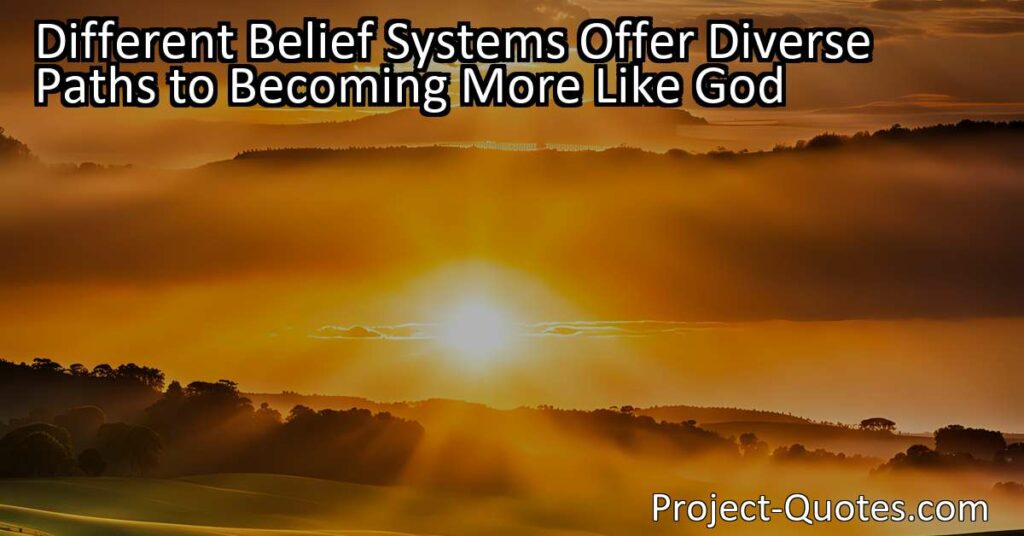The end of life is to be like God, and the soul following God will be like Him.
Socrates
Different Belief Systems Offer Diverse Paths to Becoming More Like God This article explores the profound statement by philosopher Socrates that the purpose of life is to be like God. It delves into the idea that by following God, our souls can become more like Him and analyzes how different belief systems offer various paths to connect with the divine and cultivate virtues. Embracing this quest for virtue can have a transformative impact on ourselves and the world around us.
Table of Contents
Meaning of Quote – The end of life is to be like God, and the soul following God will be like Him.
Have you ever wondered what the purpose of life is? What if I told you that the end goal of life is to be like God? This profound statement by the famous philosopher Socrates opens up a world of thought-provoking questions and existential ponderings. In this article, we will delve deeper into this quote and explore the idea that the soul, by following God, can become more like Him.
To grasp the full meaning of this quote, we must first understand who Socrates was. Socrates was an ancient Greek philosopher, known for his Socratic method of questioning, which aimed to stimulate critical thinking and self-discovery. He believed that true wisdom came from within and emphasized the importance of questioning everything.
When Socrates asserts that the end of life is to be like God, he is not suggesting that we can physically transform into divine beings. Instead, he speaks of the soul, the metaphysical essence that defines our true inner selves. According to Socrates, the soul has the potential to align itself with the divine and acquire godlike qualities.
But what does it mean to be like God? In various religious and philosophical systems, God is often seen as a figure of perfection, embodying qualities such as love, compassion, wisdom, and justice. To be like God, then, would mean to cultivate these virtuous qualities within ourselves. It is not about striving for omnipotence or godlike power, but rather about developing our moral and spiritual nature.
Socrates argues that by following God, the soul can become more like Him. This begs the question, how do we follow God? Different belief systems offer diverse paths to connect with the divine, but one common thread is the pursuit of virtue. Virtues are positive qualities that guide our actions and shape our character. They include traits like honesty, kindness, patience, and humility.
In order to be like God, Socrates suggests that we must first cultivate these virtues within ourselves. For instance, by practicing honesty, we align our soul with God’s truthfulness. By cultivating kindness, we reflect God’s love and compassion towards others. In essence, following God means embodying His virtues and allowing them to guide our thoughts, actions, and relationships.
The idea that the soul can become more like God through the pursuit of virtues has profound implications for our lives. It suggests that our purpose is not merely to accumulate wealth, achieve success, or satisfy our desires. Instead, it emphasizes the importance of leading a meaningful and ethical life, centered around the cultivation of virtues.
Think of a person you admire, someone you consider to be morally virtuous. What qualities do they possess? Perhaps they demonstrate unwavering integrity, always doing what is right even when it is difficult. Maybe they exemplify genuine compassion, showing kindness and empathy to everyone they encounter. These individuals serve as beacons of light, living embodiments of the virtues that align their souls with God.
By constantly striving to develop these virtues, we not only enhance our own character but also create a positive ripple effect in the world around us. When we embody love, we inspire others to love. When we exhibit patience, we encourage patience in others. Our actions, no matter how small, have the power to shape the world for the better.
Furthermore, Socrates’ quote challenges us to reflect on the nature of our existence. If the end of life is to be like God, then it implies that our time on Earth is a journey towards self-improvement and spiritual growth. It reminds us that we are not merely physical beings bound by our mortal bodies but rather spiritual entities with the potential to transcend our earthly limitations.
This idea also raises questions about the inherent nature of humanity. Are we born already possessing the potential to be like God, or is it something we must actively strive for? While philosophers and theologians may have differing views on this, Socrates presents the notion that the soul must actively seek to follow God in order to become more like Him.
In conclusion, Socrates’ quote “The end of life is to be like God, and the soul following God will be like Him,” invites us to consider the purpose of our existence and the potential within our souls. Although we may never fully perceive or comprehend the divine essence, we can strive to embody the virtues that define God’s nature. By cultivating virtues such as love, compassion, wisdom, and justice, we align our souls with the divine and become more like God. Our journey towards godlikeness is not only a personal endeavor but also one that can have a profound impact on the world around us. So let us embrace this quest for virtue and embark on a transformative journey to become more like God.
I hope this quote inspired image brings you hope and peace. Share it with someone who needs it today!


